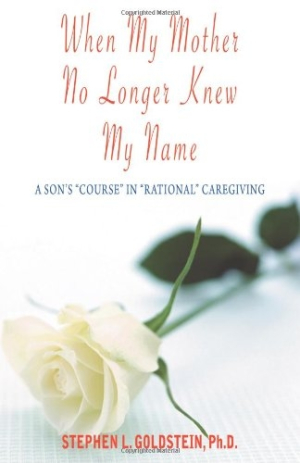
When My Mother No Longer Knew My Name
A Son's "Course" in "Rational" Caregiving
Memoirists often offer the lessons of their lives for the benefit of others, but few combine autobiography and advice as seamlessly as Stephen Goldstein in When My Mother No Longer Knew My Name. Goldstein dedicated over ten years to caring for his mother at the end of her life. His book describes a journey that required both careful planning and constant flexibility. Along with detailing his own day-to-day experiences caring for his mother at home, Goldstein offers ideas for others to consider when the time comes for them to take care of members of their own families.
Working as a trends analyst, radio personality, and TV talk show host for years has made Goldstein a master communicator. In his newspaper columns he lucidly observes the defects in America’s health-care system and offers solutions at the political level. With this book, he retains the same journalistic clarity but makes it personal by inviting readers into his home and into the reality of caring for a parent with dementia.
Goldstein clearly knows the shortcomings of the nursing home system in the United States and wanted no part of it for his intensely independent mother. His memoir could easily have become a rant-filled manifesto on a pet topic, but Goldstein instead maintains a personal tone as he offers details of life with his mother. In addition, each chapter is aptly headed with quotations ranging from sources as varied as T.S. Eliot and Freddie Mercury. Always respectful, Goldstein gently shows readers his mother’s decline from her delight in managing dinner parties to her eventual resigned acceptance of eating pureed peas. Even as Alzheimer’s disease progresses and she doesn’t seem to know him, Goldstein never loses sight of his mother as a person, offering gestures as simple and profound as always setting a formal place for her at the table.
Offset from the narrative, in script on a grey background, are pieces of advice for the reader. These are not merely quotes from the book, but practical tips from Goldstein’s experience, such as the recommendation to always call 9-1-1 immediately in an emergency instead of trying to handle it alone. Rather than distracting from the main text, these direct-to-reader messages engage and entertain, keeping the reader involved in the issues under discussion. Quizzes at the beginning and end of the book also encourage readers to take an active role.
Goldstein attributes the successful at-home caretaking of his mother largely to active planning, and encourages others to plan early and thoroughly. His practical advice is tempered with his own stories of situations that took him by surprise, reassuring readers that even without a pristine plan, they can offer meaningful caretaking to their loved ones at the end of their lives.
Reviewed by
Sheila M. Trask
Disclosure: This article is not an endorsement, but a review. The publisher of this book provided free copies of the book and paid a small fee to have their book reviewed by a professional reviewer. Foreword Reviews and Clarion Reviews make no guarantee that the publisher will receive a positive review. Foreword Magazine, Inc. is disclosing this in accordance with the Federal Trade Commission’s 16 CFR, Part 255.
